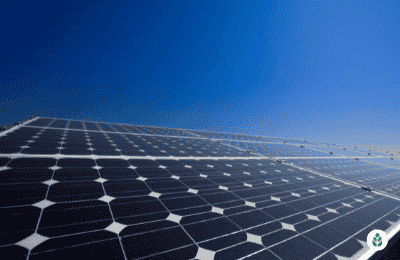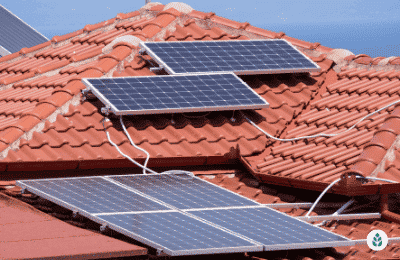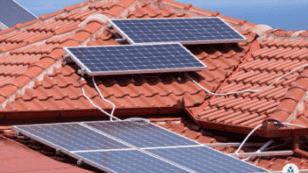
Is Solar Worth It in New Jersey? (2024 Homeowner's Guide)
In this guide on whether going solar is worth it in New Jersey, you’ll learn:
- How New Jerseyans can evaluate whether they should go solar
- What New Jerseyans should look out for when going solar
- What the benefits of going solar in New Jersey are
Each product and or company featured here has been independently selected by the writer. You can learn more about our review methodology here. If you make a purchase using the links included, we may earn commission.
New Jersey ranks 10th in the country for solar panel installations and solar adoption, and homeowners in the Garden State stand to save more money going solar than most people throughout the country. Still, solar panels aren’t beneficial for every home and won’t provide the same return on investment for every solar customer.
Below, you’ll find information on how to determine if a solar panel system is a good option for your home. We’ll also go into the benefits going solar will bring you in New Jersey and some things you should consider before committing to guarantee the best experience possible.

Blue Raven Solar
Pros
- Industry-leading in-house financing
- Competitive pricing
- Excellent reputation
Cons
- Doesn't offer solar batteries (coming 2022)

Trinity Solar

Regional Service
Average cost
Pros
- Many financing options
- Family-owned and -operated
- Makes charitable contributions
- Relatively short workmanship warranty
Cons
- Limited service area

Momentum Solar
Pros
- Great warranty coverage
- Concierge service ensures steady communication
- Representatives are experts on local policies
Cons
- Slightly limited service offerings
- Only available in 11 states
Watch Below: Learn What New Jersey’s TREC Program Is And How They Differ From SRECs
What Factors Affect Whether Solar Panels are Worth It in New Jersey?
Most New Jersey residents will find that solar is a worthwhile investment that provides enormous savings over time, around $32,398, on average, after the panels pay for themselves. However, you have to make sure your home is a good candidate for solar power before you switch to this renewable energy source. Below are some metrics for gauging your solar viability in NJ.
Your Home Electricity Consumption
Most of your ROI when converting to solar will be earned through savings on your electric bills, which means the higher your energy consumption per month is, the more valuable your panels will be. In general, power consumption under 500 kWh per month means that solar probably won’t be a good option for you. Since most residents use an average of 683 kWh per month, solar will be a worthwhile endeavor for the majority of homeowners in the state.
With that being said, the actual benchmark for solar value is a bit lower in New Jersey because of the high electricity rates — an average of 18.54 cents per kWh as opposed to the national average of 16.79 cents. For New Jersey, a consumption above around 400 is probably more accurate for being worthwhile.
You can check your monthly energy usage on your past utility bills. Most New Jersey residents use around 683 kilowatt-hours every month, which puts them below the national average but well above the cutoff used for solar viability.
As such, most New Jerseyans will find that solar panels are worth the investment, at least in terms of how much electricity they will offset with them.
Read Also: A Million NJ Utility Customers Owe a Total of $821M
Read Also: New Jersey Achieves Milestone of 4 Giga-watts of Installed Solar Power
Cost of Solar Panels in New Jersey
The price of solar equipment in New Jersey averages around $3.37 per watt, which is above the national average of $3.33. Your money won’t go quite as far per watt as it would in other states, but New Jersey homes usually require a smaller-than-average system size of just 7 kilowatts.
That puts the average total around $16,513 after the federal tax credit, which is well below the national average of $20,979. Solar panel systems are more valuable in states where energy rates are high or energy consumption is more than average. New Jerseyans use less electricity than in most US residents but pay far more per kWh. As such, New Jersey is generally considered a great place for solar conversion.
Just to put it in terms of dollars and cents, the average New Jerseyan sees a solar panel payback period of 10 years — a year faster than most Americans — and then saves an additional $32,398, nearly $1,000 more than most customers in the U.S., who save an average of $31,513.
Average Payback Period for Solar in New Jersey

The average payback period in NJ is 10 years, which is below the national average of 11 years. Based on this factor, solar is more valuable in New Jersey than in most other states. A common range for this timeline in NJ is 7 to 13 years. If your solar calculator or solar installer comes back with a payback period for your home that’s longer than 13 years but under 25 years, you’ll still save money over time, but your ROI will be lower than average in the area.
Average Buy-Back Rates in New Jersey
Many states have a mandated net metering program, which allows solar customers who participate in interconnection to earn credits to their energy bills by selling excess power production to their utility companies. Net metering helps pay back your panels more quickly and increases your ROI overall by making it more probable that you eliminate your electric bills after solar conversion.
New Jersey requires all electricity providers to offer net metering, and, best of all, the state’s Board of Public Utilities sets the buy-back rate at the retail rate. This means many customers will be able to reduce their monthly energy bills to $0 even without adding a solar battery to their system.
We should mention that other states have seen net metering policies declining over the past few years. Most notably, California, previously the most solar-friendly state in the nation, decreased its effective net metering credit rate by around 75% with NEM 3.0. This made solar less worthwhile because it severely cuts into savings. We do expect something similar in Jersey in the future, although there are no plans for that to happen at this time.
If that does happen, though, most customers will likely need to invest in solar batteries, which drive up the installation cost but offer effective net metering. Batteries cost an additional $10,000 to $20,000 in most cases. Solar is far more worthwhile in New Jersey now than it will be if net metering gets discontinued, so it’s wise to go solar before the policy is abandoned.
Amount of Sunlight Your Roof Receives
Solar panels use available sunlight to produce electricity, so the efficiency of your solar energy system depends on how much sun your roof receives. New Jersey as a whole experiences around 206 sunny days per year, which is right in line with the national average of 205. From a sunlight availability perspective, NJ is a good place for solar panel installation.
However, you also need to assess your home based on individual factors as well. For example, south-facing roofs are the best for solar panels in the US, while solar will be less valuable on west-facing roofs. North- and east-facing roofs generally aren’t suitable for solar at all in America.
You should also check your roof for shading from trees and buildings during peak production hours, as shaded areas will reduce efficiency and provide fewer savings.
Solar Outlook in New Jersey
Solar energy is widely accepted in New Jersey, with more homeowners converting to solar power than in most other states. The high rate of solar adoption is largely due to the state’s Renewable Portfolio Standard (RPS) goals and the state solar incentives that make going solar more appealing and more affordable.
Solar installations in New Jersey have more than doubled in prevalence over the past decade, and commercial and utility-scale solar have also found a foothold in the Garden State. The likelihood is that the market for solar will only continue to grow in the near future in New Jersey.
As mentioned above, net metering polices throughout the country are in jeopardy, and some have already gotten worse or discontinued. If net metering is discontinued or downgraded in New Jersey, the value of solar will go down unless you install batteries, which comes with a much higher installation cost — an average of between $10,000 and $20,000.
What Are the Benefits of Solar Energy in New Jersey?
Solar panels provide homeowners in NJ with plenty of upsides that make converting highly appealing. We’ll discuss the most significant benefits of solar panels in the area below.
Electricity Bill Savings
Solar panels are most valuable for the savings they provide on your energy bills. By producing your own power and taking advantage of the state’s outstanding net metering policy, New Jersey residents stand to save around $126.63 per month on their electric bills or an annual average of $1,519.
After your panels pay for themselves in electricity bill savings, they are expected to save an additional $32,398 over their remaining lifespan in New Jersey. Additionally, going solar means you’ll be able to avoid future bumps in electricity rates, which means your effective savings could be far higher than the averages above.
Related Article: Where to Get the Best Energy Rates in New Jersey?
Tax Incentives, Rebates & More
New Jersey is considered one of the top 10 most solar-friendly states in the country, and this is primarily because of the solar incentives available to residents.
One of the most appealing incentives is the federal solar tax credit (ITC) offered to all NJ residents by the federal government. This investment tax credit provides a credit in the amount of 30% of your total solar system cost — an average of $7,077 in NJ — to your federal income tax liability for the year your system is installed.
Other New Jersey solar incentives are listed below:
- Net Metering: As mentioned above, the State of New Jersey guarantees that all solar customers will have access to net metering, which helps you pay back your system expenses more quickly and boost your return on investment.
- Transition Renewable Energy Certificates (TRECs): All solar customers in New Jersey accrue TRECs for energy produced with their panels. TRECs, which are similar to Solar Renewable Energy Certificates (SRECs), can be sold to utility companies for an average of $90 as of 2024. Rates are subject to change.
- New Jersey Solar Tax Exemptions: In order to reduce the barrier to entry into solar energy, New Jersey waives state sales tax on all solar equipment and installation fees with this sales tax exemption.
Home Resale Value Increase
Many homeowners overlook the increase in home value afforded by solar panels, but this is a massive upside to converting to clean energy. Based on data from Zillow, the average home will jump in value by around 4.1% when a solar electric system is installed.3 Since the typical home value in NJ is around $495,469, that comes out to a standard property value increase of approximately $20,314.4
If net metering goes away and batteries become the norm, you’re looking at even more added property value. It’s difficult to calculate it exactly, but especially if net metering disappears and batteries become the only way to eliminate electric bills with solar, home value would increase even more, as batteries offer the opportunity to bring the average electric bill cost of $126.63 per month in New Jersey down to $0.
It’s important to note that an increase in home value is only afforded to solar customers who buy or finance solar panels. The same value increase is not expected for solar leases or power purchase agreements (PPAs).
Clean, Renewable Energy
Finally, there are some environmental benefits of going solar. Most notably, you’ll be less dependent on your utility company and fossil fuels, so you will decrease emissions, pollution and your contribution to climate change. You will also reduce your carbon footprint and increase your energy independence, which is great news for environmentally-conscious homeowners.
What Should You Look Out For When Considering Solar in New Jersey?
Once you confirm that solar is a good investment for your home, you’ll still have quite a few things to think about as you move toward installation. We’ll discuss some other important considerations below.
Upfront Fees

You can keep your upfront investment to a minimum by choosing cheaper solar panel brands, limiting your solar equipment to panels alone and choosing a solar financing option that requires little or no money down. All of these things can reduce overall savings but will keep your upfront expenditure down.
Payback Period
Your estimated payback period is more helpful than just determining your solar viability, as it can also help estimate your long-term savings when you go solar. The typical payback period in NJ is 10 years, and anything between 7 and 13 years is considered standard. If your timeline is longer, it will take you longer to recuperate your investment, and your overall savings will be lower than average.
Net Metering Policies in New Jersey
Net metering is mandatory in New Jersey, so all solar customers can benefit from this policy. Best of all, the state sets the buy-back rate at the retail rate, which is higher in NJ than in most states. This makes it relatively easy for New Jerseyans to reduce their energy bills to $0 per month, even without the addition of a solar energy storage solution. Just keep in mind that these policies are in limbo throughout the country, so double check with your installer or your electric company that it’s available to you before converting to clean energy.
Pending Policies & Changes to Incentives
The solar industry is still expanding and improving, which means the policies and incentives mentioned above can change without warning. Incentives could disappear in the near future, policies could change and new rebate programs could pop up. You’ll likely save more overall if you don’t wait for better incentive programs to appear, but you should always check for changes and new solar policies before converting.
Weather & Climate in New Jersey
Cloudy weather can reduce panel efficiency by up to 90%, which means sunny states are far better suited for solar conversion. New Jersey receives about 206 days of sunshine per year, making it around average in terms of sunshine availability and solar panel potential. In general, the state gets plenty of sunlight to make solar a viable option.
Some residents worry that the above-average precipitation and the potential for nor’easters in the area make solar less valuable overall. Rain will actually just serve to keep dirt and debris off your panels, keeping them clean and helping to maintain peak sun absorption. As far as extreme weather, a warranty for your equipment should be plenty to allay your concerns.
Companies Pushing Solar Leases or PPAs
Finally, it’s important to know that not all solar companies are created equal, and choosing one is a crucial decision you’ll have to make. Generally, it’s best to stay away from companies advertising “free panels” or pushing solar leases or power purchase agreements (PPAs). These options are usually not in your best interest.
Solar leases don’t let you take advantage of the federal tax credit, they don’t positively affect your home value and they lead to far fewer savings over time, leaving you with a lower return on investment if any at all. In an area like New Jersey, where solar is so popular, you also need to be wary of solar scams. Specifically, state officials in Gloucester County have warned residents about inflated savings claims and unrealistic returns from companies over-selling solar leases.5
There have also been reports from 6 ABC Action News in NJ about aggressive sales tactics and shady business practices from disingenuous solar installers throughout the state.6 You can avoid scams and losing your investment into solar by only working with a vetted and reputable solar installer.
Wrap Up: Are New Jersey Solar Panels Worth It?
The large majority of New Jersey homeowners will find that going solar is a great investment that provides massive savings and valuable benefits. However, solar panels aren’t right for everyone, and determining your home’s solar viability should be your first step when thinking about going solar.
Some things to remember to consider include your monthly energy bills, your home’s energy efficiency, the size and price of the solar system you need, shading on your property and more. Given how complicated it can be to calculate if your home is a good candidate for solar, we recommend having a reliable solar panel installation company help you decide.
See also: Find out how much solar power your roof can produce with our solar calculator
Read More About Going Solar
- What Are the Best Solar Companies in New Jersey?
- What Incentives Are Available to New Jersey Solar Customers?
- How Much Do Solar Panels Cost in New Jersey?
The cost information presented in this article is derived from a comprehensive analysis, incorporating data from multiple industry sources. The average cost per watt per state was calculated based on figures from Consumer Affairs, Energy Sage, and Berkeley Lab’s Electricity Markets & Policy Department. Additionally, monthly energy consumption and the average monthly cost of electricity were sourced from the U.S. Energy Information Administration, ensuring a well-rounded and accurate representation of the information presented.
FAQs: Is Solar Worth It In New Jersey
At EcoWatch, we’re thrilled to get questions from New Jersey homeowners about the prospect of going solar and the benefits solar panel systems can provide. Below are some common questions we see from homeowners in your area and our responses to set you in the right direction.
If you have specific questions that aren’t answered here, reach out to our team of solar experts at solar@ecowatch.com.
The average solar panel payback period in New Jersey is 10 years, which is shorter than in most states. Many homeowners will find that their timeline falls between 7 and 13 years. The longer your payback period, the longer it will take you to recuperate your investment and the lower your return will be overall.
Your payback period can fall well below or above this typical range based on several factors. Some things that extend the payback period are below average energy consumption, a roof that doesn’t face south, and shading on your property from trees or buildings.
For most New Jersey homeowners, installing a solar energy system will save a large sum of money over the lifespan of the equipment. Assuming you have an average home and average energy needs, you can expect your system to pay for itself in about 10 years and provide additional energy savings totaling around $32,398 over the remaining 15 years of expected system performance.
Most of the time, yes! While solar leases and power purchase agreements (PPAs) will not make your home more valuable, using cash or a solar loan to acquire your panels will boost your property value. Estimates from Zillow suggest a bump of around 4.1% or an average of $20,314 in New Jersey. Unfortunately, this will also bump up your property taxes a bit, as NJ does not offer a property tax exemption.
Yes, permits are a requirement for solar panel installation in New Jersey. Building permits will usually be handled by your solar installer, and the permit expenses will be built into your estimated total system amount.
You can install your own solar panels in New Jersey, but it’s not recommended. The process is both complicated and dangerous, and you’ll be putting your safety, your home and your photovoltaic equipment at risk by implementing a DIY solution. We strongly recommend deferring to an experienced and licensed installer instead.
Top Solar Installers in New Jersey Cities
Comparing authorized solar partners
-
- Industry-leading in-house financing
- Competitive pricing
- Excellent reputation
- Doesn't offer solar batteries (coming 2022)
A+Best Solar Financing2014Trina Solar, Canadian Solar, SolarEdge, Silfab, SunPower25-year manufacturer warranty; 10-year workmanship warranty, 2-year production guarantee
Having trouble deciding? Click below and use our process to receive multiple quotes instead:

 233k
233k  41k
41k  Subscribe
Subscribe 






